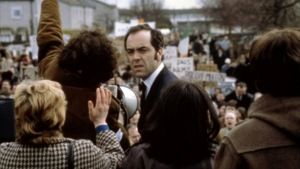News
Irish ambassador recalls The Troubles two decades after helping to end them
This article is more than 7 years old.
Cinemateket film festival will provide insight into one of Brexit’s biggest sticking points: the future of border between Northern Ireland and the EU member state located to its south

‘Bloody Sunday’ (Paul Greengrass, 2002) will open the festival on November 6
Historians tend to disagree when The Troubles started, or indeed how to accurately describe the three-decade conflict that revolved around the constitutional status of Northern Ireland and the UK’s decision to station British military forces there in 1969.
The IRA, the Irish republican paramilitary group, and its allies fought a mostly clandestine war against the British troops and North Irish unionists and loyalists, which often spread onto the British mainland in the form of civilian bombings and public figure assassinations.
Most agree, however, when The Troubles ended. The Good Friday Agreement of 1998 brought to an end a conflict that claimed the lives of 3,500 people, of whom 52 percent were civilians.
And now 20 years later, and approximately 50 years after the start of ‘The Troubles’, the Irish Embassy in Copenhagen together with the Centre for Irish Studies at Aarhus University are holding a special film festival at Cinemateket to recall the conflict.
Involved in Good Friday peace talks
The Troubles holds particular resonance for the current Irish ambassador, Cliona Manahan, as she was the only woman involved in the negotiations of the Good Friday Agreement through her role working for the Irish government’s Department of Foreign Affairs and Trade with responsibility for the Anglo Irish Division.
Recently in Copenhagen, at the 100th anniversary of the Danish branch of the English-Speaking Union, she told those present that bridge-building had become second nature to her growing up in a family divided by politics, geography and religion – like many Irish families.
Throughout her endeavours, she has held onto two adages – “The sooner the bridges are built, the stronger the links become” and “One mouth but two ears” – and they have served her well.
Nothing is more important, she said, than getting to know each other better: by talking and listening.
Films rooted in fact
The title of the festival, ‘Troubles Cinema – Nordireland I krig og fred 1968-2018’, would appear to pinpoint the civil rights march in Derry on 5 October 1968 as the beginning of The Troubles (although some historians suggest the formation of the Ulster Volunteer Force in 1966 as a starting point, and others that they started in 1969).
The organisers of the festival, which is scheduled to run from November 6 to December 22, hope to take the opportunity to help the public understand more about the Irish border issue in the ongoing Brexit negotiations.
Most of the screenings will accordingly have introductions to help the audience understand how the film touches on historical events and issues relevant to today’s Brexit talks.
The festival’s opening film is ‘Bloody Sunday’, and the other films include ‘In the Name of the Father’, ‘Hunger’, ‘Nothing Personal’, ‘Good Vibrations’ and the documentary ‘In the Name of Peace’.
For the November 14 screening of ‘In the Name of Peace’, the director of the film, Maurice Fitzpatrick, will hold a Q&A to complete the evening.
It would appear that the festival has chosen to only show films rooted in historical accuracy, thus avoiding fictional fare such as ‘The Crying Game’, ‘The Devil’s Own’ and ’71’.
For a full list of the films, check this link.











































